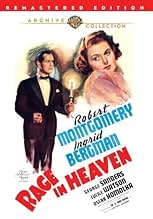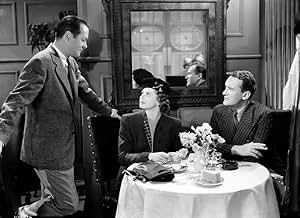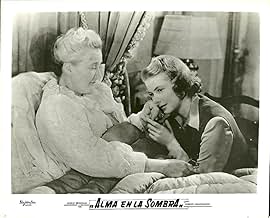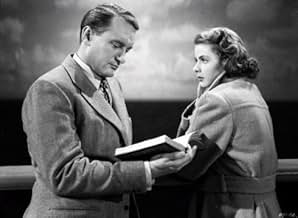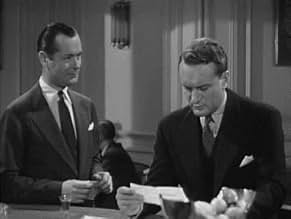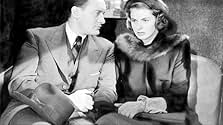AVALIAÇÃO DA IMDb
6,4/10
1,4 mil
SUA AVALIAÇÃO
Adicionar um enredo no seu idiomaRobert Montgomery and George Sanders team up to play against type in this probing psychological thriller that features Ingrid Bergman as the object of their obsessions.Robert Montgomery and George Sanders team up to play against type in this probing psychological thriller that features Ingrid Bergman as the object of their obsessions.Robert Montgomery and George Sanders team up to play against type in this probing psychological thriller that features Ingrid Bergman as the object of their obsessions.
- Direção
- Roteiristas
- Artistas
- Prêmios
- 3 vitórias no total
Frederick Worlock
- Solicitor-General
- (as Frederic Worlock)
Ludwig Hardt
- Durand
- (as Ludwig Hart)
Stuart Hall
- Traveling Salesman
- (cenas deletadas)
Major McBride
- Bank Clerk
- (cenas deletadas)
Clive Morgan
- Traveling Salesman
- (cenas deletadas)
Joseph North
- Undertaker
- (cenas deletadas)
Wyndham Standing
- Dr. McTernan
- (cenas deletadas)
Harry Allen
- Jury Foreman
- (não creditado)
Avaliações em destaque
This psychological thriller involved a leading man who was brooding over his perceived mistreatment by MGM (Robert Montgomery), and a director, Woody Van Dyke, who was having a difficult physical and emotional time of it to the point that two other directors had to get involved. And yet it worked overall, although I feel it could have pulled together better than it did with a more cohesive vision.
Montgomery had said he was not going to act in this one, just read his lines. Yet his detached demeanor actually works as he is portraying Phillip Monrell, a man whose paranoia comes out of nowhere. He is the charming Robert Montgomery character of the high society comedies for the first 30 minutes of the film. And then becomes - without explanation - very paranoid. He has been overseas, only to return to England, meet, and marry his ailing mother's paid companion, Stella Bergen (Ingrid Bergman), in a whirlwind courtship. Ingrid you have to stop marrying in haste! You got lucky with Victor Lazslo in "Casablanca", but not this time!
And Monrell is most of all jealous of his long time "friend", engineer Ward Andrews (George Sanders). He begins to think his wife and Ward are having an affair. And this seems laughable as Sanders is for once portraying somebody who is admirable and completely guileless. Or is he??
There is a mystery patient at an insane asylum who escapes at the beginning of the film. You never see his face. And this never comes up until the end when a doctor there, Oscar Homolka, shows up at a crucial juncture. He is a very welcomed presence as he assaults a shopkeeper with his umbrella so an important phone call can be made.
Definitely worth watching. But there is just an odd lack of chemistry between the leads.
Montgomery had said he was not going to act in this one, just read his lines. Yet his detached demeanor actually works as he is portraying Phillip Monrell, a man whose paranoia comes out of nowhere. He is the charming Robert Montgomery character of the high society comedies for the first 30 minutes of the film. And then becomes - without explanation - very paranoid. He has been overseas, only to return to England, meet, and marry his ailing mother's paid companion, Stella Bergen (Ingrid Bergman), in a whirlwind courtship. Ingrid you have to stop marrying in haste! You got lucky with Victor Lazslo in "Casablanca", but not this time!
And Monrell is most of all jealous of his long time "friend", engineer Ward Andrews (George Sanders). He begins to think his wife and Ward are having an affair. And this seems laughable as Sanders is for once portraying somebody who is admirable and completely guileless. Or is he??
There is a mystery patient at an insane asylum who escapes at the beginning of the film. You never see his face. And this never comes up until the end when a doctor there, Oscar Homolka, shows up at a crucial juncture. He is a very welcomed presence as he assaults a shopkeeper with his umbrella so an important phone call can be made.
Definitely worth watching. But there is just an odd lack of chemistry between the leads.
A somber-hued melodrama whose psychology is more compelling than its dramaturgy, Rage in Heaven sounds many of the minor-key motifs and dark timbres that would shortly coalesce into the noir cycle. Its most striking aspect has to be its acceptance of its disturbed central character as a given, without attempting to supply a neat, reassuring `explanation.'
The story set in England, for no good reason opens with a teasing prelude at a French insane asylum. But soon, in London, we meet up with Robert Montgomery as he meets up with old chum George Sanders and whisks him off to the country house of Montgomery's widowed mother (Lucile Watson), who in ailing health has retained the services of a companion (Ingrid Bergman). Though Bergman and Sanders generate some electricity, when he departs she marries Montgomery. This proves ill-advised.
Montgomery, who reluctantly has taken charge of the family's steel works, shows himself to be not only incompetent, irrationally jealous and vindictive, but also self-loathing, desperately insecure, and (as it turns out, like his father) suicidal. He requires unquestioned obedience, even at the risk of running his business into the ground or poisoning his marriage. He lures back Sanders in order to validate his suspicions of an affair between his wife and his best friend but, when no evidence emerges, devises a fiendish plot to ruin all their lives. His plans almost succeed, but for an eleventh-hour deus ex machina, in the person of the head of that sanitarium in the outskirts of Paris.
Though somewhat cleverly contrived, the ending remains a contrivance yet doesn't quite invalidate the movie's dark vision (perhaps owing more to Christopher Isherwood, who wrote the screenplay, than to James Hilton's novel). Montgomery elects to play a charming villain, as he did in Night Must Fall, perhaps unsure of just how to depict a deranged psyche (he wasn't far off the mark). Sanders gets wasted as a square-rigger, which was never his long suit.
That leaves the radiant Bergman, two years before Casablanca assured her stardom, handed the thankless world of the loyal, longanimous wifey. In this flawed but unsettling and precocious melodrama, it's she who utters the final benediction. That benediction lingers in the mind as an enlightened touch and a far cry from the black/white mentality of today's thrillers, which view psychological aberration as just a more heinous kind of evil, and so a further justification for triumphantly exterminating the evildoers.
The story set in England, for no good reason opens with a teasing prelude at a French insane asylum. But soon, in London, we meet up with Robert Montgomery as he meets up with old chum George Sanders and whisks him off to the country house of Montgomery's widowed mother (Lucile Watson), who in ailing health has retained the services of a companion (Ingrid Bergman). Though Bergman and Sanders generate some electricity, when he departs she marries Montgomery. This proves ill-advised.
Montgomery, who reluctantly has taken charge of the family's steel works, shows himself to be not only incompetent, irrationally jealous and vindictive, but also self-loathing, desperately insecure, and (as it turns out, like his father) suicidal. He requires unquestioned obedience, even at the risk of running his business into the ground or poisoning his marriage. He lures back Sanders in order to validate his suspicions of an affair between his wife and his best friend but, when no evidence emerges, devises a fiendish plot to ruin all their lives. His plans almost succeed, but for an eleventh-hour deus ex machina, in the person of the head of that sanitarium in the outskirts of Paris.
Though somewhat cleverly contrived, the ending remains a contrivance yet doesn't quite invalidate the movie's dark vision (perhaps owing more to Christopher Isherwood, who wrote the screenplay, than to James Hilton's novel). Montgomery elects to play a charming villain, as he did in Night Must Fall, perhaps unsure of just how to depict a deranged psyche (he wasn't far off the mark). Sanders gets wasted as a square-rigger, which was never his long suit.
That leaves the radiant Bergman, two years before Casablanca assured her stardom, handed the thankless world of the loyal, longanimous wifey. In this flawed but unsettling and precocious melodrama, it's she who utters the final benediction. That benediction lingers in the mind as an enlightened touch and a far cry from the black/white mentality of today's thrillers, which view psychological aberration as just a more heinous kind of evil, and so a further justification for triumphantly exterminating the evildoers.
"Rage in Heaven" belongs to the spate of Freudian movies of the forties: Hitchcock's "spellbound" Lang's "secret beyond the door" Tourneur's "cat people" Stahl's "leave her to heaven" Siodmak's "dark mirror" ,the list is endless.
"Rage in heaven" is an excellent underrated thriller.Although Philip's mother part is underwritten ,she predates the Hitchcockian mums ,those of "Notorious" "Strangers on a train" "Marnie" etc.Robert Montgomery whose character is the most interesting portrays a rich kid,probably victim of his over possessive mother -"he's more attractive than Ward" - A selfish paranoiac man who will not be satisfied till he destroys everything.His behavior makes sense:the cat,then the best friend (the enemy ,for his wife is in love with him),the wife and finally himself ,the doctor explains.
The screenplay might not be thoroughly original,but "Leave her to heaven" (1946) borrows Gene Tierney's diabolical suicide from it,and the final search has something of Cornell Woolrich (aka William Irish) ,notably his "phantom lady".
Three excellent actors,and a gripping story: you will not waste your time.
"Rage in heaven" is an excellent underrated thriller.Although Philip's mother part is underwritten ,she predates the Hitchcockian mums ,those of "Notorious" "Strangers on a train" "Marnie" etc.Robert Montgomery whose character is the most interesting portrays a rich kid,probably victim of his over possessive mother -"he's more attractive than Ward" - A selfish paranoiac man who will not be satisfied till he destroys everything.His behavior makes sense:the cat,then the best friend (the enemy ,for his wife is in love with him),the wife and finally himself ,the doctor explains.
The screenplay might not be thoroughly original,but "Leave her to heaven" (1946) borrows Gene Tierney's diabolical suicide from it,and the final search has something of Cornell Woolrich (aka William Irish) ,notably his "phantom lady".
Three excellent actors,and a gripping story: you will not waste your time.
This film, based on a James Hilton novel, is not often seen these days. In part, the material Christopher Isherwood extracted from the book doesn't make a good movie. As directed by W. S. Van Dyke, the film seems to have been sabotaged by its star, Robert Montgomery, who made no secret he didn't want to be in the picture. It's a shame because the rest of the players are evidently acting in a different movie.
The melodrama has some interesting things going for it. First there is the luminous appearance of Ingrid Bergman in her third Hollywood film. Also, George Sanders has one of the best roles he ever played in the movies. Both Ms. Bergman and Mr. Sanders are the reason for watching. Lucile Watson, Oscar Homolka and Philip Merivale, among others, make great contributions to the film.
While this is not by any means a horrible film, it could have been improved if only Mr. Montgomery, a welcome presence in any movie, would have done a better job inter acting with the rest and following direction.
The melodrama has some interesting things going for it. First there is the luminous appearance of Ingrid Bergman in her third Hollywood film. Also, George Sanders has one of the best roles he ever played in the movies. Both Ms. Bergman and Mr. Sanders are the reason for watching. Lucile Watson, Oscar Homolka and Philip Merivale, among others, make great contributions to the film.
While this is not by any means a horrible film, it could have been improved if only Mr. Montgomery, a welcome presence in any movie, would have done a better job inter acting with the rest and following direction.
One of James Hilton's lesser novels got a lesser production from MGM with his Day Of Reckoning becoming Rage In Heaven. This has to be one of the few instances where a psychiatrist saves the day.
I think it ironic that Robert Montgomery got cast in the lead here against his usual type. It must have been an easier sell to Louis B. Mayer to cast him after having proved his acting chops in Night Must Fall. Playing another charming maniac got Montgomery an Academy Award nomination in that film. So Mayer having been convinced was less reluctant to have him cast here.
When we first meet Montgomery we find him inside an insane asylum in France and while his doctor, Oscar Homolka is discussing his case, Montgomery up and escapes from the place. Making it back to Great Britain he goes back to his mother's place and Lucille Watson as the mother welcomes him, not knowing of his hiatus in the booby hatch.
She's got a nice new secretary/companion in Ingrid Bergman and Montgomery likes her lot. She likes George Sanders his good friend and incidentally it was Sander's character name under which Montgomery was in the asylum under.
Montgomery woos and wins Ingrid, he's now running Watson's factory and that makes him a big man and no doubt helps his cause with Ingrid. Sanders is now working for him. But this Othello has his own Iago inside him provoking the green eyed monster without any outside provocation.
When Bergman turns to Sanders after one of Montgomery's inexplicable rages, Montgomery conceives a diabolical plot to frame Sanders for his own murder. That's the best part of the film, there's no way Sanders could have or should have gotten out of it. Especially without Montgomery to be questioned.
I liked the fact that both Montgomery and Sanders were playing against type. Sanders is a good guy, one of the few films he's not working any angles. Ingrid was steadfast and loyal, her part's not that much of a stretch for her talents.
I won't give away the ending, but let me say it was way too contrived and coincidental. Rage In Heaven does not belong in the top tier of films for any of the three leads.
I think it ironic that Robert Montgomery got cast in the lead here against his usual type. It must have been an easier sell to Louis B. Mayer to cast him after having proved his acting chops in Night Must Fall. Playing another charming maniac got Montgomery an Academy Award nomination in that film. So Mayer having been convinced was less reluctant to have him cast here.
When we first meet Montgomery we find him inside an insane asylum in France and while his doctor, Oscar Homolka is discussing his case, Montgomery up and escapes from the place. Making it back to Great Britain he goes back to his mother's place and Lucille Watson as the mother welcomes him, not knowing of his hiatus in the booby hatch.
She's got a nice new secretary/companion in Ingrid Bergman and Montgomery likes her lot. She likes George Sanders his good friend and incidentally it was Sander's character name under which Montgomery was in the asylum under.
Montgomery woos and wins Ingrid, he's now running Watson's factory and that makes him a big man and no doubt helps his cause with Ingrid. Sanders is now working for him. But this Othello has his own Iago inside him provoking the green eyed monster without any outside provocation.
When Bergman turns to Sanders after one of Montgomery's inexplicable rages, Montgomery conceives a diabolical plot to frame Sanders for his own murder. That's the best part of the film, there's no way Sanders could have or should have gotten out of it. Especially without Montgomery to be questioned.
I liked the fact that both Montgomery and Sanders were playing against type. Sanders is a good guy, one of the few films he's not working any angles. Ingrid was steadfast and loyal, her part's not that much of a stretch for her talents.
I won't give away the ending, but let me say it was way too contrived and coincidental. Rage In Heaven does not belong in the top tier of films for any of the three leads.
Você sabia?
- CuriosidadesW.S. Van Dyke took over the direction of the movie from Robert B. Sinclair, who became ill shortly after shooting began. Van Dyke was in the Marines, but was granted a 14-day leave to finish the picture. Neither Sinclair nor Van Dyke was available for re-takes, which were then directed by Richard Thorpe.
- Erros de gravaçãoThe movie commences with a quote, "Heaven hath no rage like love to hatred turned", which it attributes to Milton. The quote is in fact from William Congreve's play "The Mourning Bride".
- Citações
Stella Bergen: My life is like this clearing. Nice and peaceful with paths leading in all directions. Only, I don't know which one to take.
Principais escolhas
Faça login para avaliar e ver a lista de recomendações personalizadas
- How long is Rage in Heaven?Fornecido pela Alexa
Detalhes
- Data de lançamento
- País de origem
- Idiomas
- Também conhecido como
- Rage in Heaven
- Locações de filme
- Empresa de produção
- Consulte mais créditos da empresa na IMDbPro
- Tempo de duração
- 1 h 25 min(85 min)
- Cor
- Proporção
- 1.37 : 1
Contribua para esta página
Sugerir uma alteração ou adicionar conteúdo ausente


